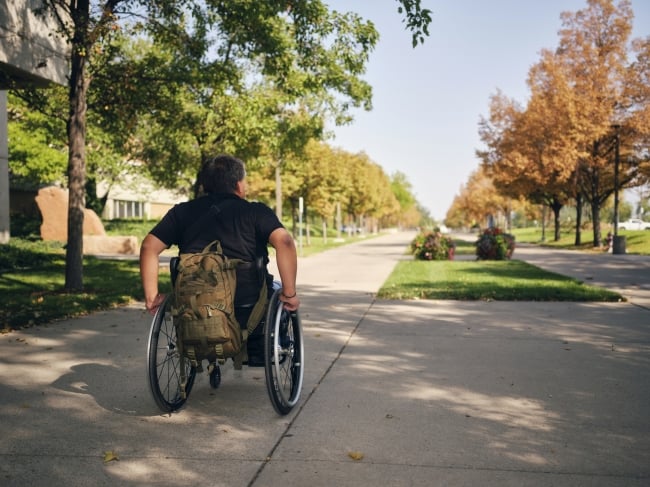You have /5 articles left.
Sign up for a free account or log in.

Campus facilities can help engage affinity groups of students, including student veterans.
RichLegg/E+/Getty Images
For students with military experience, leaving the service, acclimating to college life and living among other students can be a challenge.
To promote belonging and feelings of community for student veterans, many institutions of higher education create resource offices and liaison staff roles to coordinate programming. A growing trend is providing a physical place on campus to allow for less structured engagement between peers as well as staff, which can increase retention and graduation outcomes for learners.
Inside Higher Ed compiled five new or developing facilities that target military-affiliated students through providing spaces for students to feel like they belong on campus.
What’s the need: Since 1944, when the first GI Bill was signed, higher education institutions have considered how best to serve former military service members in academic programs and co-curricular offerings.
Previous research shows veterans who take advantage of the Post–9/11 GI Bill—which provides grants to veterans who served after Sept. 10, 2001, for up to the full cost of public institutions in the state they reside—have higher completion rates compared to financially independent students nationally and earn more than those without a credential. However, some equity gaps exist among student veterans, with veterans of color less likely to graduate within six years and women who complete earning less than their male counterparts.
Veterans in rural areas are also less likely to enroll in higher education, despite residing more heavily in these areas.
A research article published this summer by the Western Interstate Commission for Higher Education found creating spaces for student veterans to feel recognized and as though they’re contributing to the institution can help ease their transition to civilian life and improve retention.
- Northwest Vista College, Alamo College District
Northwest Vista College, located in the San Antonio region, celebrates the opening of the Esperanza Veterans Center today. Plans for the new building include health and well-being features, including a dog park for service animals.
One design consideration campus leaders prioritized was limiting potential triggers by making the space feel open, airy and quiet. The center will also house academic advising, career counseling and mental health support, as reported by Texas Public Radio.
- University of Wisconsin–Madison
In June, the Universities of Wisconsin system Board of Regents approved a proposal to expand and establish greater supports for student veterans on campus. The university will allocate funds for a University Veteran Services staff member to lead student success initiatives for military-affiliated learners and will form a task force on student veterans’ financial support.
Additionally, the university will establish a memorial plaza for veterans and possibly relocate the veterans’ services office, with future hopes to establish a joint services officer education facility.
- Brown University
This fall, Brown University opened the renovated Office of Military-Affiliated Students (OMAS), including a lounge and working area as well as a kitchenette for student veterans and those in ROTC.
The office’s previous location was much smaller and only able to accommodate a limited number of students at a time. As the military-affiliated student population at Brown has grown, so has the office’s footprint.
“Beyond support and services, OMAS aims to offer a physical landing spot on campus for military-affiliated students—a place where they can study, rest between classes, organize meetings or simply hang out with friends,” according to a university press release.
- Florida State University
The university received $83 million in new funds from the state for capital projects, $7.5 million of which will be allocated to the Veterans Legacy Complex. The complex will bring together three stand-alone buildings and offices on campus to create more unified support for military-affiliated people: the Institute on World War II and the Human Experience, the Student Veterans Center, and the Reserve Officer Training Corps training facility.
“This complex will allow FSU to better address the unique academic, social and compliance issues concerning student veterans and active military student population, while also elevating these students’ contributions,” according to an appropriations project request.
- Wesleyan University
In September, Wesleyan University in Connecticut celebrated the grand opening of a new Veterans Lounge, which creates a dedicated space for students to study, gather and share a meal.
Inside the lounge, students can utilize a multipurpose room, a quiet study area with computers, couches and television, or the kitchenette. One special feature is a scratch-off map poster, where students can show where they’ve served across the world.
Campus leaders have said they hope this helps student veterans better connect with one another and attracts future military-affiliated students considering the university.
If your student success program has a unique feature or twist, we’d like to know about it. Click here to submit.



